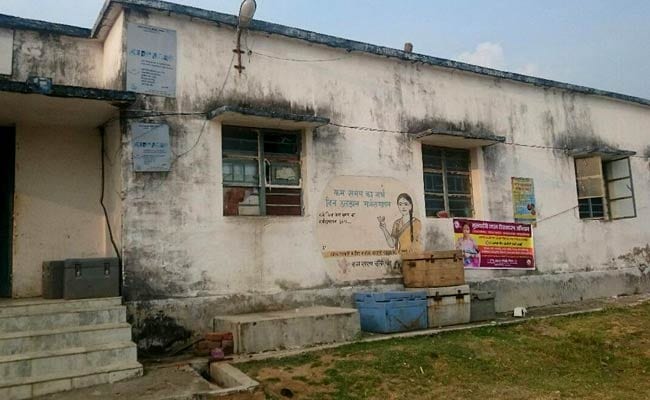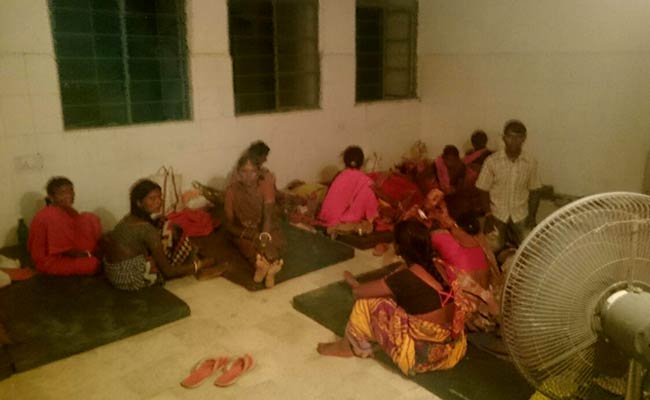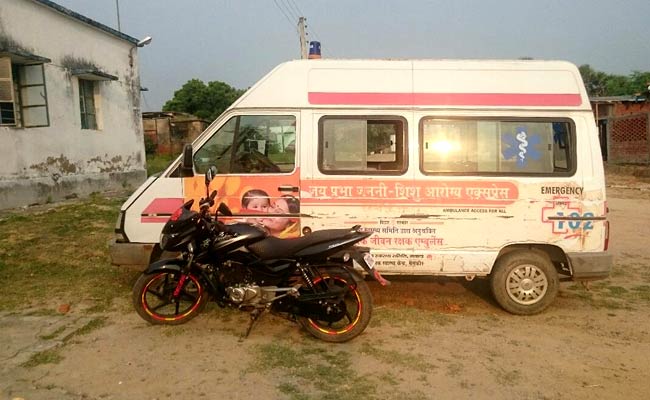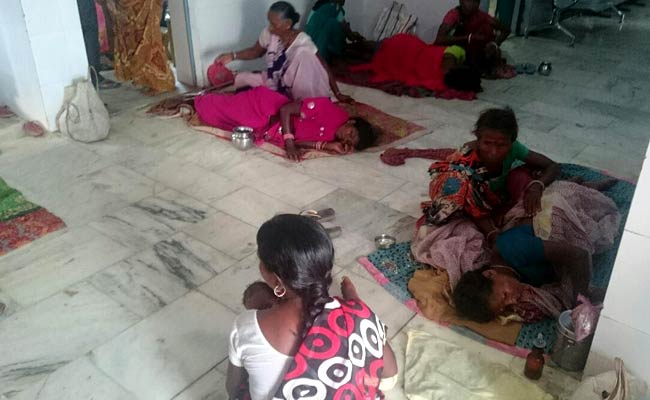Post-surgery patients in the corridors of a yet to be inaugurated hospital building near the Rajauli Primary Health Care Centre in Nawada, Bihar.
Nawada, Bihar:
Three hours after undergoing a sterilization surgery, Sona Devi is lying on the floor of a hospital in Bihar's Nawada district. There are 18 other patients who are stretched out near her. Patients considered more critical are assigned the six beds that the hospital offers.
Bihar has 500 rural hospitals like this one - Primary Health Care Centres - run entirely by the government. Each of them is meant to provide assistance to 50,000 people - as opposed to the national average of 30,000.
 Sona Devi pleads with the staff for water. Doctors tell her that's not possible so soon after her surgery. In any case, the hospital has no running water. Buckets are brought in every few hours - and that water is undrinkable, says Dr Om Prakash. "We have an overhead tank, we fetch water from a distance, and fill up that tank every day. Or we get a tanker to do it."
Sona Devi pleads with the staff for water. Doctors tell her that's not possible so soon after her surgery. In any case, the hospital has no running water. Buckets are brought in every few hours - and that water is undrinkable, says Dr Om Prakash. "We have an overhead tank, we fetch water from a distance, and fill up that tank every day. Or we get a tanker to do it."
Sona Devi is 40 years old; her husband and she earn about Rs 4,000 a month. He is a farmer, she is a daily wage worker. Her post-surgery medicines, including pain killers, are meant to be provided at no cost. But doctors say at least four crucial medicines, including those needed for post-operative care for sterilizations and deliveries, have not been supplied for months by the government's Health Department.
 "Doctors say I will have to buy the medicines from outside. We are very poor, it costs us money that we can hardly afford but what can we do?" asks Sona Devi's relative, Anam Devi.
"Doctors say I will have to buy the medicines from outside. We are very poor, it costs us money that we can hardly afford but what can we do?" asks Sona Devi's relative, Anam Devi.
We just haven't got the medicines from the government. We have funds to purchase the medicines locally, but the funds get exhausted quickly," says Dr Badri Prasad, the senior most doctor at the hospital.
As he asks voters for a third term, Chief Minister Nitish Kumar said that each Primary Health Centre - the 500 rural hospitals - either have, or are within months of having - six doctors in charge. There are two at this one.
Bihar has just 30% of the government doctors needed for state-run hospitals.
At the Rajauli primary health care centre, about 30 kms away from Maksaur, there are five empty beds. The sixth is being used by Asha Kumari, who is expected to deliver her baby soon.
 The Bihar government says every patient admitted to its rural hospitals is entitled to three free meals every day. Asha Kumari hasn't been given any. "We never give food to any of our patients, there's no system for that here", said a nurse. Relatives have delivered meals to Asha Devi, but if she wants to use the bathroom, she has to wade through stagnant water to reach the only toilet, a stinking mess. A new set of toilets has been recently built but remains locked because of a red-tape delay in clearances.
The Bihar government says every patient admitted to its rural hospitals is entitled to three free meals every day. Asha Kumari hasn't been given any. "We never give food to any of our patients, there's no system for that here", said a nurse. Relatives have delivered meals to Asha Devi, but if she wants to use the bathroom, she has to wade through stagnant water to reach the only toilet, a stinking mess. A new set of toilets has been recently built but remains locked because of a red-tape delay in clearances.
As the District Magistrate of Nawada, Manoj Kumar is the top administrative official in the area. When the grim catalogue of shortages and inadequacies are laid out for him, he says, "I will look into this and fix responsibility. Lack of medicines is a state-level problem. Tenders for medicines have not been finalised at the state level. We went for tenders but no one has turned up to supply food at the Primary Health Care Centres."
 "I agree that the situation needs to improve but please also appreciate that we have ensured that patients are coming into these health care centres. There is a daily footfall at these centres and this is a marked difference from 10 years ago when almost no one used to go to these centres because they were defunct," said the Chief Minister recently.
"I agree that the situation needs to improve but please also appreciate that we have ensured that patients are coming into these health care centres. There is a daily footfall at these centres and this is a marked difference from 10 years ago when almost no one used to go to these centres because they were defunct," said the Chief Minister recently.
And then came the promise of further improvement, if voters back him in the election that starts in mid-October. "We have bigger plans which we will implement and in the next five years, we hope that the level of facilities at such health centres will improve drastically, more doctors are also being recruited."
Bihar has 500 rural hospitals like this one - Primary Health Care Centres - run entirely by the government. Each of them is meant to provide assistance to 50,000 people - as opposed to the national average of 30,000.

The Maksaur Primary Healthcare Centre has two doctors and no running water supply.
Sona Devi is 40 years old; her husband and she earn about Rs 4,000 a month. He is a farmer, she is a daily wage worker. Her post-surgery medicines, including pain killers, are meant to be provided at no cost. But doctors say at least four crucial medicines, including those needed for post-operative care for sterilizations and deliveries, have not been supplied for months by the government's Health Department.

Women on the floor of the Maksaur Primary Health Care Centre after sterilization surgeries.
We just haven't got the medicines from the government. We have funds to purchase the medicines locally, but the funds get exhausted quickly," says Dr Badri Prasad, the senior most doctor at the hospital.
As he asks voters for a third term, Chief Minister Nitish Kumar said that each Primary Health Centre - the 500 rural hospitals - either have, or are within months of having - six doctors in charge. There are two at this one.
Bihar has just 30% of the government doctors needed for state-run hospitals.
At the Rajauli primary health care centre, about 30 kms away from Maksaur, there are five empty beds. The sixth is being used by Asha Kumari, who is expected to deliver her baby soon.

An ambulance outside the Maksaur Primary Health Care Centre
As the District Magistrate of Nawada, Manoj Kumar is the top administrative official in the area. When the grim catalogue of shortages and inadequacies are laid out for him, he says, "I will look into this and fix responsibility. Lack of medicines is a state-level problem. Tenders for medicines have not been finalised at the state level. We went for tenders but no one has turned up to supply food at the Primary Health Care Centres."

The Maksaur Primary Health Care Centre has six beds but they are mostly reserved for critical patients.
And then came the promise of further improvement, if voters back him in the election that starts in mid-October. "We have bigger plans which we will implement and in the next five years, we hope that the level of facilities at such health centres will improve drastically, more doctors are also being recruited."
Track Latest News Live on NDTV.com and get news updates from India and around the world

